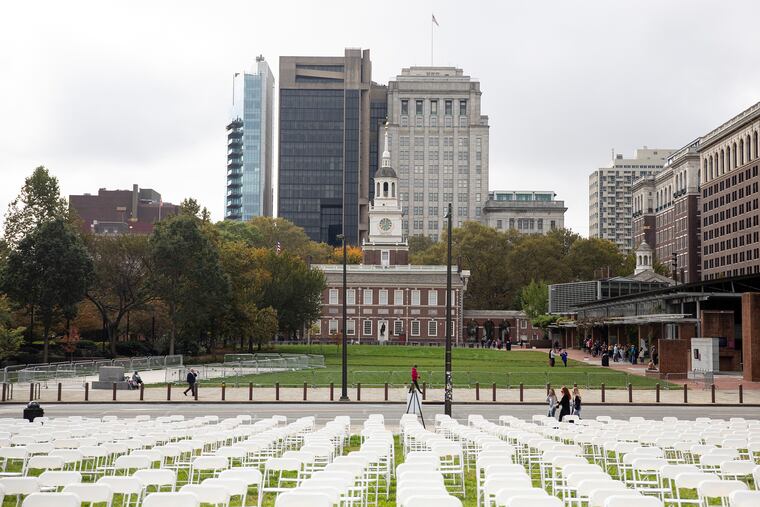Pennsylvania’s COVID-19 deaths marked by empty chairs at Independence Mall: ‘These are people. They are not a statistic.’
Each of the more than 860 empty chairs lining Independence Mall symbolized 10 people who’ve died from the coronavirus in Pennsylvania.

A sea of more than 860 white chairs sat empty on Independence Mall for eight hours on Friday, each one symbolizing 10 people who’ve died from COVID-19 in Pennsylvania this year and will never sit with their loved ones again.
One chair was for Ray Dougherty of Port Richmond, who was the first person his daughter Liz Feeney called after the Eagles won the Super Bowl in 2018. Another was for Hiram Green of Allentown, an Army veteran whose kids never got to say a word to him — not even goodbye — after he was diagnosed with COVID-19 at the state-run Southeastern Veterans' Center in Chester County and died a week later.
Bari Himes' mother, Rose Phillips, who was buried in her hospital gown and two body bags after she was deemed contagious — even in death — was represented, too. And, Noe Sepulveda, a nurse anesthetist who was diagnosed with COVID-19 at the same time as his mother, Teresa, came to represent them both, after she lost her 36-day battle in May. His mother emigrated from Mexico and worked as a shoemaker.
“This is a very moving and very touching tribute,” said Sepulveda, 47, of Pine Hill, Camden County, as he looked over the empty chairs on what would have been his mother’s 74th birthday. “It puts a visual on the lives. These are people. They are not a statistic.”
On the day when Pennsylvania recorded its highest-ever single day count of new COVID-19 cases since the beginning of the pandemic — 2,219 — COVID-19 survivors came together to share their stories and visualize their loss at a socially-distanced event organized by COVID Survivors for Change, a nationwide nonprofit that tells the personal stories of those affected by the pandemic and advocates for lifesaving policies.
“It’s not a hoax and it’s not a joke. You get this false pretense everything will be OK and it’s not OK,” said Himes, 46, of Horsham, whose mom beat stage four breast cancer only to die from COVID-19 in April. “Even as we’re speaking, the number is growing and there is a face, there is a soul to these numbers.”
On Friday, the state Department of Health reported that 8,625 Pennsylvanians have died so far from the disease and more than 182,400 people have contracted it statewide. On a national scale, more than 222,400 people have died and almost 8.4 million people have been diagnosed with COVID-19, according to the Centers for Disease Control.
Earlier this month in Washington, D.C., COVID Survivors for Change placed 20,000 chairs on the Ellipse there, each representing more than 10 people who’ve died nationwide from the coronavirus. Chris Kocher, executive director of the group, said his organization is seeking to create tributes across the country that visually capture the devastation COVID-19 has wrought.
“Humans are almost not built to understand the sheer volume of loss we’ve experienced with the suddenness we’ve experienced,” he said. “The chairs are a very disruptive visual of the representation of loss. The absence of people being in the chairs prompts you to think about the scale of the loss and it captures the way the pandemic has, at the most basic level, disrupted our ability to be together.”
In speeches and in prayers, and in quotes recited from the Bible and from the Founding Fathers — who mere steps away at Independence Hall once declared that all men have the unalienable right to life, liberty, and the pursuit of happiness — survivors pleaded for people to believe this disease is real and deadly, and for their leaders to do something about it.
“May truth and empathy be the touchstones of people setting policies for our protection,” Rev. Jeffery Jordan said in his invocation. “May these chairs remind us of the value and fragility of human life.”
Feeney, 42, of Northeast Philly, whose otherwise healthy 70-year-old father died on July 4 from COVID-19, said the callous rhetoric and misinformation surrounding the coronavirus in the United States is devastating to those who’ve lost someone to the disease.
“We live in a country that’s become so selfish it’s almost unrecognizable to me,” she said. “The United States of America I love is better than this. We are better than this.”
At one point during the socially-distanced ceremony an elderly couple — whose masks hung well below their noses — walked through the reporters and survivors on hand, loudly repeating: “Don’t forget the aborted babies!” and “Where are their chairs?”
After the ceremony, Feeney lamented those who dismiss the virus.
“COVID is one of those things that so often doesn’t affect you until it does,” she said.
Carol Lewis, 58, who drove 13 hours from her home in Georgia to memorialize her father, Hiram Green, said our leaders have failed the victims of COVID-19 and it remains up to the survivors to make sure their loved ones' lives — and deaths — were not in vain.
As she turned her attention from the small crowd and began speaking directly to her dead father, Lewis’ eyes welled with tears.
“Dad, I’m in Philadelphia today to honor you and tell the world how special you are and how much I love and miss you,” she said.